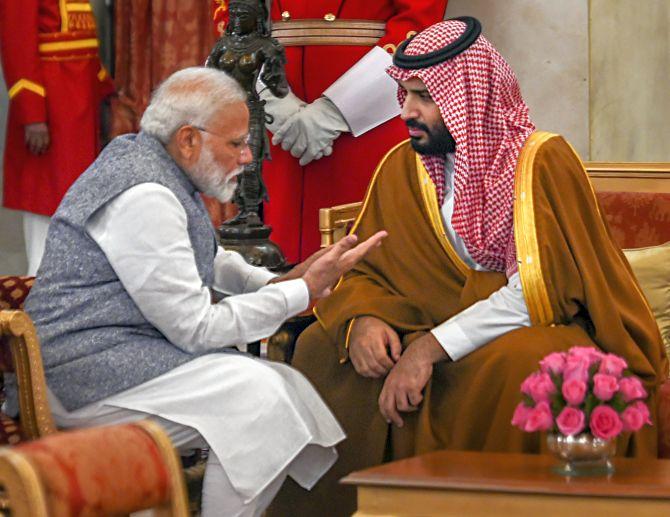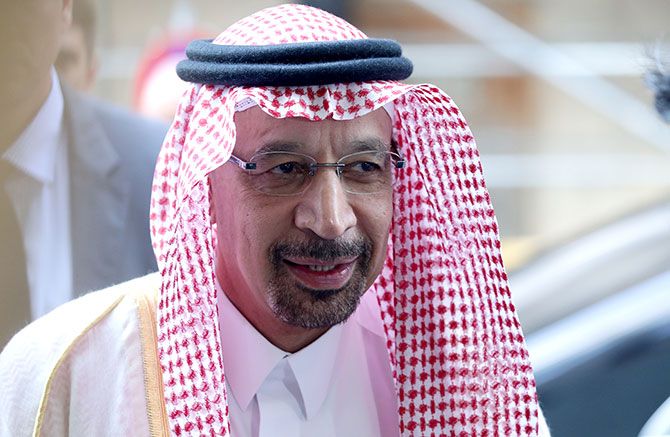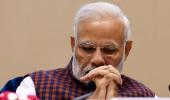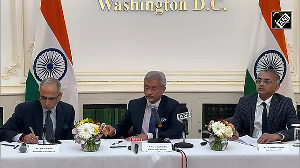'We began foolishly bragging about Saudi-Emirati investment plans as indicative of the sheikhs 'distancing' from Pakistan, including on Kashmir,' notes Ambassador M K Bhadrakumar.

The India-Saudi relationship was historically a finely poised balance of mutual interests despite all contradictions. Its glacial pace had an inner logic — don't push too hard, as life is real.
But the Modi government quickened the pace -- probably with an eye on Muslim politics.
Petrodollar recycling is largely about the bulk of petrodollar surpluses that is held either in US treasury bills and other short-term instruments or in American and Western European banks.
But in the Saudi-Indian context, it is about the international spending or investment of Saudi Arabia's sovereign wealth accumulated from the country's oil exports.
Its potential to create incredible relationships of interdependency among elites heavily influenced by government-level decisions and based in capital flows remains untested.
Unsurprisingly, the movers and shakers among the elites assume larger-than-life profile.
Former Saudi oil minister Khalid al-Falih was a titanic figure.
Out of India's tango with Al-Falih, two mega projects were conceived.
The first is the proposed 60 million tonnes-a-year refinery-cum-petrochemical joint venture in Ratnagiri district in Maharashtra (announced in June 2018), estimated at $44 billion and involving an Indian consortium comprising State-owned companies -- Indian Oil Corporation, Bharat Petroleum Corporation, and Hindustan Petroleum Corporation Ltd -- who will jointly own 50 percent of the mega project with Saudi Aramco and Abu Dhabi National Oil Company owning the rest 50 per cent.
The second is a reported deal in the pipeline between Reliance Industries and Saudi Aramco, which was forecast by Mukesh Ambani last month, who termed it as one of India's largest foreign direct investments till date.
While addressing shareholders at the 42nd AGM of the company in Mumbai on August 11, Ambani disclosed that Saudi Aramco intended to acquire a 20 per cent stake in Reliance's oil-to-chemicals business.
To be sure, Reliance's shares surged overnight by as much as 11 percent following Ambani's dramatic disclosure of plans to sell stakes in the firm's oil and chemicals business to the Saudi oil giant.
Analysts estimate the surge in Reliance shares as its biggest intraday jump since February 33, 2017 and that the rally in the stock may have helped RIL reclaim a Rs 8 lakh crore market capitalisation.
Awesome, indeed!
There has been much media hype in India about the two projects involving Saudi Aramco, but the Saudi side has been reticent.
The Ratnagiri project is bogged down in land acquisition problems.
And it now transpires that the tectonic plates are shifting in the Saudi oil ministry and Saudi Aramco.

On August 30, Saudi King Salman bin Abdulaziz Al Saud issued royal decrees that included dividing the energy, industry and mineral resources ministry, previously overseen by Oil Minister Falih, into two ministries -- the energy ministry and the industry and mineral resources ministry.
For the latter which controls oil industry, King Salman chose Saudi private sector investor and businessman Bandar Alkhorayef to lead.
On September 2, it came to be known that Al-Falih was being summarily replaced as chairman of Saudi Aramco by Yasir al-Rumayyan, governor of the public investment fund, the kingdom's sovereign wealth fund and its primary investment vehicle.
On September 7, King Salman issued another royal decree altogether replacing Al-Falih as the energy minister.
The successor is a member of the royal family -- Prince Abdulaziz bin Salman, a son of the king. Abdulaziz has had decades of experience with the OPEC.
Now, Saudi Arabia never had a royal as its energy minister since 1960, given high sensitivity due to concerns that it might create about balance of power in the dynasty.
The stability of oil-related decisions in Saudi Arabia has come under limelight.
Al-Falih was not particularly close to the powerful Saudi Crown Prince Mohammed bin Salman and had reportedly pushed back on the Aramco IPO plan.
By removing him from the top echelons, Aramco, the world's most profitable company, is being prepared for what may be the biggest initial public offering ever.
Clearly, MbS has taken direct control of the Aramco and his priority is toward putting the company's IPO back on track.
MbS's 'big picture' --Vision 2030 -- is about shaking up traditional Saudi society by introducing reforms, which no doubt has a visionary side to it, and he is almost certain to turn to futuristic investments out of the Aramco rather than be in more traditional or conventional investments.
Put differently, MbS is re-calibrating the outsized role that oil plays in the Saudi economy.
He is credited with a famous remark in 2016 that Aramco is a 'company that has a value -- an investment. You must own it as an investment. It should not be owned as a primary commodity or a major source of income.'
Aramco accounts for about 67% of the government's revenue.
This is where Aramco's Indian partners have reason to be deeply concerned.
Al-Falih has known Ambani for many years, and even travelled to Udaipur last December to attend the pre-wedding festivities of Ambani's daughter's marriage.
And Al-Falih, who served at the Aramco for three decades and was a gifted mediagenic personality well versed in international diplomacy and business relations, has his wings clipped in a hugely significant shake-up.
Apparently, MbS felt frustrated with Al-Falih's pace in pursuing opportunities for developing the non-oil sectors.
And Al-Falih's removal forms part of a profound policy overhaul.
Will India remain an investment priority for Saudi Aramco?
Our lackadaisical performance on the Ratnagiri project has dented our credibility.
Meanwhile, as grandstanding before the domestic audience, we began foolishly bragging about Saudi-Emirati investment plans as indicative of the sheikhs 'distancing' from Pakistan, including on Kashmir.
The fantasies are dissipating.











 © 2025
© 2025